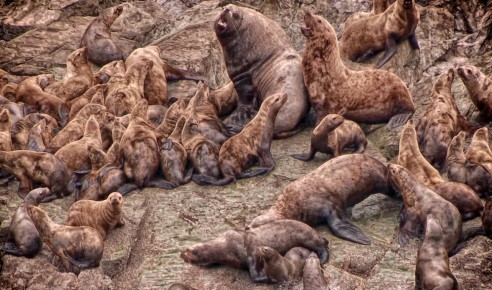Fisheries stock assessment involves applying population dynamics models to make predictions of stock size, productivity and status relative to reference points established by fishery managers. Stock assessment is integral to the management of most of the world major fish and invertebrate stocks, and is used to provide advice on the status and trends of marine mammals and even seabird populations. The results from stock assessments are used to apply harvest control rules to evaluate whether stocks are in an overfished state or are experiencing overfishing, and to the form the basis for management strategy evaluation.
Researchers from the Puntlab are involved in many aspects of stock assessment. We collaborate extensively with scientists from the Northwest Fisheries Science Center, the Alaska Fisheries Science Center, and the Center for the Advancement of Population Assessment Methodology.
Our focus for stock assessment research is based on ‘integrated’ or state-space methods, in which the model of the population dynamics is separate from that which relates the model predictions to the observed data. We base stock assessments on age-structured models, size-structured models, multispecies models, and models which represent the spatial dynamics of populations. The stock assessment methods developed by the Puntlab have been used in fisheries in the U.S., Australia, South Africa, by the International Commission for the Conservation of Atlantic Tunas and the International Whaling Commission. The following are major current areas of research for members of the Puntlab:
- Development of new ways to include monitoring data in stock assessments, especially in data-limited and data-poor situations.
- Quantification of uncertainty: when should you apply Bayesian methods, asymptotic approaches or likelihood profile?
- How to include multispecies interactions into traditional assessments approaches (the Models of Intermediate Complexity “MICE” approach).
- Marine Protected Areas and spatial management, and their impact on the performance of stock assessments.
- Developing rebuilding plans for overfished stocks.
- Testing of new and existing methods of stock assessment.
The research of the following Puntlab graduate students focused on aspects of stock assessment:
- Teresa A’Mar (MS, 2004) Quantifying error and uncertainty in fishery stock assessment models
- Jason Cope (PhD, 2008) Issues and advances in data-limited stock assessment: Experimentation through simulation
- Melissa Haltuch (PhD, 2008) Modeling human and climate impacts on the management of the Pacific north west groundfish fishery
- Tommy Garrison (MS, 2010) The value of Marine Protected Areas for improving stock assessments
- Doug Kinzey (PhD, 2010) Multispecies stock assessment with predator-prey interactions
- Chantel Wetzell (MS, 2011) Challenges of data-limited stock assessments: Simple vs. Complex stock assessment techniques and the influence of data
- James Thorson: (PhD, 2011) Improved estimation of behaviors, ecological processes, and abundance trends in marine species using multi-species mixture distribution models, autonomous underwater vehicles, and multi-state tag-resighting models
- Cody Szuwalski (PhD, 2014) Reaching management objectives given uncertainty: A management strategy evaluation of the eastern Bering Sea snow crab (chionocetes opilio) fishery
- Chantel Wetzell (PhD, In progress) Management strategy evaluation for the determination of annual catch limits using probability based methods for West Coast groundfish
